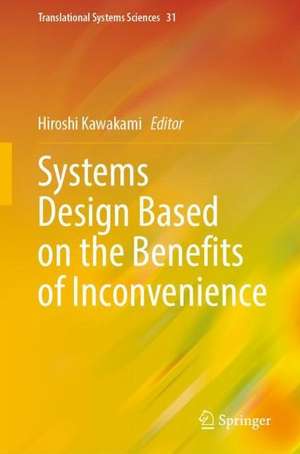Systems Design Based on the Benefits of Inconvenience: Translational Systems Sciences, cartea 31
Editat de Hiroshi Kawakamien Limba Engleză Hardback – 25 mar 2023
Din seria Translational Systems Sciences
- 20%
 Preț: 628.88 lei
Preț: 628.88 lei - 15%
 Preț: 642.51 lei
Preț: 642.51 lei - 18%
 Preț: 948.92 lei
Preț: 948.92 lei - 18%
 Preț: 786.52 lei
Preț: 786.52 lei - 20%
 Preț: 661.65 lei
Preț: 661.65 lei - 18%
 Preț: 720.68 lei
Preț: 720.68 lei - 18%
 Preț: 782.57 lei
Preț: 782.57 lei -
 Preț: 384.09 lei
Preț: 384.09 lei - 18%
 Preț: 728.43 lei
Preț: 728.43 lei -
 Preț: 447.24 lei
Preț: 447.24 lei - 15%
 Preț: 654.30 lei
Preț: 654.30 lei - 18%
 Preț: 783.20 lei
Preț: 783.20 lei -
 Preț: 389.11 lei
Preț: 389.11 lei - 18%
 Preț: 882.82 lei
Preț: 882.82 lei - 18%
 Preț: 884.22 lei
Preț: 884.22 lei - 18%
 Preț: 728.91 lei
Preț: 728.91 lei - 18%
 Preț: 723.69 lei
Preț: 723.69 lei - 18%
 Preț: 776.09 lei
Preț: 776.09 lei - 18%
 Preț: 891.48 lei
Preț: 891.48 lei - 18%
 Preț: 1106.31 lei
Preț: 1106.31 lei - 18%
 Preț: 1106.79 lei
Preț: 1106.79 lei - 18%
 Preț: 775.30 lei
Preț: 775.30 lei -
 Preț: 385.08 lei
Preț: 385.08 lei - 15%
 Preț: 635.65 lei
Preț: 635.65 lei - 18%
 Preț: 944.99 lei
Preț: 944.99 lei - 18%
 Preț: 1113.26 lei
Preț: 1113.26 lei - 18%
 Preț: 1114.02 lei
Preț: 1114.02 lei
Preț: 941.68 lei
Preț vechi: 1148.40 lei
-18% Nou
Puncte Express: 1413
Preț estimativ în valută:
180.21€ • 187.45$ • 148.78£
180.21€ • 187.45$ • 148.78£
Carte tipărită la comandă
Livrare economică 15-29 aprilie
Preluare comenzi: 021 569.72.76
Specificații
ISBN-13: 9789811995873
ISBN-10: 9811995877
Pagini: 100
Ilustrații: IX, 100 p. 1 illus.
Dimensiuni: 155 x 235 mm
Greutate: 0.34 kg
Ediția:2023
Editura: Springer Nature Singapore
Colecția Springer
Seria Translational Systems Sciences
Locul publicării:Singapore, Singapore
ISBN-10: 9811995877
Pagini: 100
Ilustrații: IX, 100 p. 1 illus.
Dimensiuni: 155 x 235 mm
Greutate: 0.34 kg
Ediția:2023
Editura: Springer Nature Singapore
Colecția Springer
Seria Translational Systems Sciences
Locul publicării:Singapore, Singapore
Cuprins
1. Fuben-eki: A Japanese for "benefits of inconvenience" and a value axis orthogonal to efficiency and functionality.- 2. Ideation support for designing systems with benefits of inconvenience.- 3. Fuben-eki in service design.- 4. The third value in Value engineering: value in benefits of inconvenience.- 5. Supporting human activities by utilizing obstruction.- 6. Weak robots: a relational approach to social robotics with our well-being.- 7.Tourism engineering for supporting stroll.- 8.Application of Fuben-eki to travel commerce and its large-scale social implementation.- 9. Product design work in the post-smart era" -Explanation of the Student Competition of Japan Industrial Design Association as an example.
Notă biografică
Hiroshi Kawakami is a professor at Kyoto University of Advanced Science, in Japan. He received his Bachelor, Master, and Dr. Eng. degrees from Kyoto University. He started his career at Okayama University as an assistant professor. He joined Kyoto University, where he was an associate professor of Graduate School of Informatics and a program-specific professor of Design Unit. His research interests include systems design, where he has proposed FUBEN-EKI that stands for designing systems based on appreciating "benefits of inconvenience." He received best paper awards of Transactions of the Society of Instrument and Control Engineering (1990, 2001, 2013), the Transactions of Human Interface Society (2009, 2018), and Journal of Society of Automotive Engineers of Japan (2014).
Textul de pe ultima copertă
This book is about the "benefits of inconvenience (BoI)", providing a new approach to designing innovative systems and opening an alternative viewpoint to readers for looking at the world. BoI says that convenient living has “black boxed” the processes we used to rely on, while BoI is about looking at the benefits that were originally provided by these actions that have been black-boxed. Consider the relationship between humans and artificial objects, or things, newly created by engineering technology. In the past, things were “extensions” of people, but before we knew it, things began to substitute for people. BoI can be a keyword for thinking about the relationship that should come after “substitution”. It is a principle of systems design, one that requires time and effort rather than being convenient without any bother. Leading system scientists, technology creators, service producers, and product designers have contributed to this volume. In the first half of the book, many researchers describe their theory of BoI from the perspectives of systems engineers, value engineers, designers, and innovators. In the second half of the book, examples of implementing BoI are introduced in various fields, such as product design, service design, social robotics, tourism engineering, and human activity support systems. They will support innovations in systems or services. It is generally said that necessity is the mother of invention. In that belief, inconveniences should be eliminated, which can be a motive force for new technological development. On the other hand, this book shows that inconveniences are not something to be eliminated, but, on the contrary, are essential to obtain some benefit, and shows us how to create beneficial inconveniences.
Caracteristici
Presents a new approach to designing innovative systems focusing on the benefits of inconvenience Consists of design theories and examples in the fields of product design, service design, and others Shows which inconveniences bring which benefits
